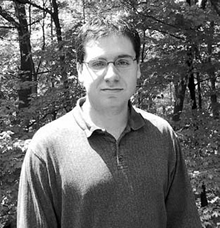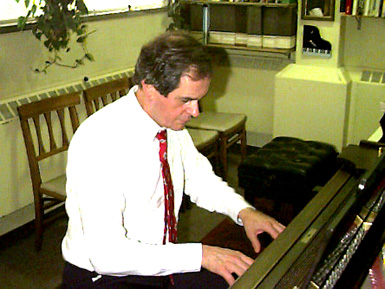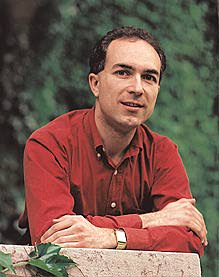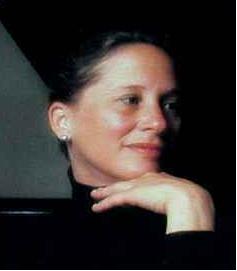Guest Speakers and Performers
Laura  Mazza-Dixon
Mazza-Dixon
Presented Finding Common Ground, a workshop about improvisation over a Ground Bass on Saturday, Feb. 26, 2005 from 11:30a.m.�3:30p.m. at Mt. Nittany UMC In Lemont, PA
After presenting examples of how composers of Renaissance and Early Baroque music improvised over a Ground Bass, Ms. Mazza-Dixon showed the group of 18 teachers, parents, and students how to make small changes according to the rules of the time. The changes began simply with an added scale degree three or five and an altered rhythm, but became more complex as other tones were added within the five finger position and later within the scale.
About the Presenter:
Laura Mazza-Dixon, a native of State College, has been a private classical guitar teacher since 1978. She currently teaches in Granby Connecticut where she has a studio of students ranging from 4 to 7- years of age.
Ms. Mazza-Dixon studied classical guitar under David Leisner, Philip de Fremery, and Jerry Willard and Viola da Gamba with Judith Davidoff and Grace Feldman. She attended Oberlin College and the University of Massachusetts and received her Bachelors of Music in Classical Guitar Performance at Penn State University. She received her Masters of Fine Arts in the Performance of Medieval and Renaissance Music at Sarah Lawrence College. In addition she receive training in the Suzuki method for classical guitar from Frank Longay and William Kossler in 1992 and is certified to teach parent education and repertoire for Books I - VI.
On classical guitar, Ms. Mazza-Dixon has given numerous concerts as a member of the Village Fair Duo, with Carrie Crompton on hammered dulcimer, listed on CCA Performing Artists Roster from 1992-2000.
On viola da gamba she was a Member of the Penn State Collegium Musicum; Director of the Fantasia Consort; and a guest artist with the Hartt Collegium Musicum and for the Litchfield Chamber Orchestra.
In addition to performances, Ms. Mazza-Dixon has given numerous workshops on Renaissance and Baroque music and on guitar pedagogy. Her topics range from The Music of Henry Purcell to Finding Common Ground; an Improvisational Workshop. She was conference presenter at the 2002 Suzuki Conference in Minneapolis, MN where she gave a workshop Teaching Young Children to Sightread Music on Guitar.
Augustus  Arnone
Arnone
Augustus Arnone is a pianist with unique and diverse interests. In addition to performing on the modern piano, he has presented recitals of solo and chamber music using historical instruments spanning the entire history of the piano. Tecent projects include showcasing music of the Bach family, performed on a replica of an eighteenth century five-octave piano, as well as music of Beethoven, Mendelssohn, Schubert, and Brahms using a variety of Romantic-era pianos. Mr. Arnone has concertized throughout the United States and has recently been heard at Summer Music Festivals in Austria and Slovenia. He is also active as a performance practice scholar, presenting lectures and colloquia on a variety of historical performance topics, and will be presenting a paper entitled The Aesthetics of Textural Ambiguity: Brahms and the Changing Piano at the 2004 conference of the American Musicological Society.
Mr. Arnone is also deeply committed to the performance and promotion of contemporary music. He has premiered numerous solo and chamber works and in 2005 will give the NY premieres of Roberto Sierra's Piezas Imaginarias and four new Etudes by David Rakowski. He has also premiered several new works written for the fortepiano including Requieto-Irrequito by Peter Savli, first performed at the 2002 Early Music Festival in Radovlicza, Slovenia. In September of 2005 he will perform three prize-winning chamber works including fortepiano at Syracuse University, sponsored by the Society for new Music. Mr. Arnone's repertoire also includes works by Elliot Carter and Frederick Rzewski.
Mr. Arnone holds degrees from the Boston Conservatory, the University of Michigan, and will be completing the degree of Doctorate in Musical Arts from Cornell University in September of 2004. Principal teachers include Malcolm Bilson, Logan Skelton, Jonathon Bass, Penelope Crawford, and William Heiles.
Marvin  Blickenstaff
Blickenstaff
Education: B.Mus., Oberlin Conservatory of Music, 1959; Dankstipendium, Frankfurt Hochshule for Musik, 1960; M.Mus., Indiana University, 1961.
Professional Activities: Joined the Goshen College faculty in 1978 after having served as chairman of piano instruction at the University of North Carolina/Chapel Hill. 1992-93 was Professor of Music at The Catholic University of America, Washington, D.C. Currently teaches Applied Piano at the College of New Jersey and the New School for Music Study in Princeton.
Blickenstaff is known throughout the country as a recitalist and lecturer. His lecturing includes national and state conventions of the Music Teachers National Association and workshops with local music teacher organizations throughout the USA. In 1990, he was honored by the Indiana Music Teachers Association with the Teacher of the Year citation. For eight consecutive summers he has served on the faculty of the International Workshops in Austria, Canada, France, Scotland, Norway and Switzerland. In 1997, he was invited by the Registered Piano Teachers of New Zealand for a 15-lecture tour of that country. In that same year he was selected to present the featured master class at the MTNA national convention.
Music Pathways, a 36-book series for beginning piano students, was co-authored by Blickenstaff, Louise Bianchi, and Lynn Freeman Olson. He has recently co-authored the extensive Celebration Series: A Handbook for Teachers. Blickenstaff has served on the editorial board of the American Music Teacher and is an Associate Editor of the quarterly Keyboard Companion.
Taken from the website of Marvin Blickenstaff at www.goshen.edu with permission from Marvin Blickenstaff.
 Sergey Schepkin
Sergey Schepkin
CPMTA in collaboration with the State College Suzuki Program and the Music Academy hosted the outstanding Russian pianist, Sergey Schepkin on October 12, in the State College Area High School South Auditorium at 8:00 p.m.with over a hundred people in attendance. In addition, Mr. Schepkin gave a two hour masterclass to five students in the area between the hours of 12:00 noon and 2:30 p.m. in the Esber Recital Hall of Penn State's Music Building I. The masterclass open to all students and teachers was free, although donations were accepted to help pay for the use of the facilities. Mr. Schepkin gave remarkable insights into the composers of the pieces which the participating students played. In addidition he talked about things like dynamics stating that the term piano was really to be played at about a normal speaking volume. As he worked with the students, you could hear the improvement in their playing.
Mr. Schepkin was born in St. Petersburg, Russia where he began to play the piano at the age of five. His piano teachers include Alexandra Zhukovsky, Grigory Sokolov, Alexander Ikharev, Ekaterina Murina, and Maria Mekler from the St. Petersburg Conservatory. While there he studied composition with Sergey Wolfensohn and Boris Arapov. At present, Mr. Schepkin is finishing his doctorate at the New England Conservatory of Music in Boston, where he received the Artist Diploma, studying under Russell Sherman. He is currently on the faculty there and is an active chamber musician. In addition, he has taught piano at his alma mater in St. Petersburg.
He has won numerous prizes including the 1992/93 Presser Foundation Award, First Prize of the prestigious International Competition for Young Musicians in Prague at the age of sixteen, as well as top prizes at the All USSR Competition, the Queen Sonja International Music Competition in Oslo, and most recently, the 1993 Harvard Musical Association Award.
 Rebecca Penneys
Rebecca Penneys
CPMTA in collaboration with the Penn State University School of Music hosted Rebecca Penneys on March 30, 2002 in Room 122 of Music Building II. Ms. Penneys gave a masterclass to three local students.
In addition to the masterclass, Ms. Penneys presented ideas for teachers to help students focus. She related how difficult it was for her as a child to stay relaxed and focused at the piano. Using techniques she learned as a dancer, she began to choreograph movements at the piano.
Ms. Penneys focused on rhythm activities like passing a balloon around while spelling out the familiar sentence, "Mary had a little Lamb." Everytime a person tapped the balloon, he said a letter in order and to the beat. Other activities followed, including those involving charts where notes were read to a metronome beat.
Finally, she ended her exercises with those activities which involved breathing. Ms. Penneys emphasized the importance of breathing with the phrases of the music, much like a singer learns to do.